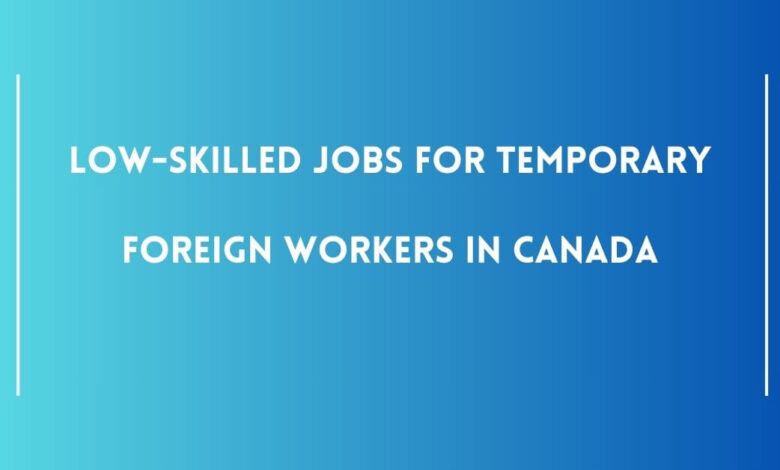Low-skilled Jobs For Temporary Foreign Workers in Canada

Canada provides a plethora of alternatives for temporary foreign workers (TFWs) who are in search of low-skilled employment opportunities in a diverse array of sectors. Hospitality, agriculture, retail, construction, and healthcare are all industries that require these positions. They offer entry-level positions that do not necessitate extensive formal education or specialized training. These opportunities can result in permanent residency for TFWs who are pursuing meaningful Canadian work experience.
Are you prepared to explore the most prominent low-skilled employment opportunities in Canada for TFWs? Then, we invite you to explore the diverse employment opportunities in Canada’s hospitality, agriculture, retail, and construction sectors, which offer TFWs the chance to secure positions in a wide range of industries.
Check Also: Taxi Driver Jobs in Canada Visa Sponsorship
In Canada, there is a high demand for temporary foreign laborers with low skills, particularly in positions that require minimal formal education or specialized training. The following are typically included in these sectors.
List of Low-skilled Jobs For Temporary Foreign Workers in Canada
Agriculture
This sector consistently employs a substantial amount of TFW. Temporary foreign workers comprised over half of agricultural laborers in Canada during prime seasons, as per Statistics Canada. The National Farmers Union underscores the necessity of temporary foreign workers (TFWs) for the tasks of planting, harvesting, and animal care. They assert that it is challenging to recruit and retain agricultural workers in Canada for these physically taxing, seasonal positions.
Retail establishments in Canada encounter persistent recruitment challenges for customer support personnel, stockers, and cashiers. These professions, which are frequently referred to as “limited-skill” under the Training, Education, Experience, and Responsibilities (TEER) system, may be suitable for TFWs who are pursuing temporary employment.
Construction
Labor shortages may arise in the construction sector during periods of elevated demand or for specialized skilled trades. TFWs can assist by assuming positions in general labor, gardening, and specific professions that necessitate on-the-job training in conjunction with trained Canadian workers.
Hospitality
Labor shortages are frequently encountered in the retail sector of Canada, particularly in entry-level positions, at hotels, restaurants, and other establishments. The Canadian Chamber of Commerce emphasizes the role of temporary foreign workers (TFWs) in addressing these deficiencies, which encompasses culinary preparation and service, housekeeping, and guest services.
Manufacturing
TFWs may be employed in Canadian manufacturing facilities for packaging, cleaning, or production line tasks. Although these positions do not necessitate a high level of formal education, they frequently necessitate specific skills and contribute to the overall production process.
Benefits of Low-skilled Jobs For Temporary Foreign Workers in Canada
Top Low-Skilled Jobs in Each Major Sector in Canada
The following tables contain the top five low-skilled jobs in each main sector of Canada, as well as their National Occupational Classification (NOC) codes and annual average salaries, as obtained from Canada’s Job Bank.
Agriculture
The following are the most prominent low-skilled positions in Canada’s agricultural sector.
| Agricultural Sector Low-skilled Jobs | NOC Codes | Annual Average Salaries (CAD) |
|---|---|---|
| Farm Worker | 85100 | 49,451.06 |
| Crop Farm Worker | 84120 | 49,450.70 |
| Dairy Farm Worker | 85100 | 49,445.26 |
| Greenhouse Worker | 85103 | 47,853.41 |
| Fruit Picker | 85101 | 43,867.88 |
Retail
The following are the most common low-skilled positions in Canada’s retail sector.
| Retail Sector Low-skilled Jobs | NOC Codes | Annual Average Salaries (CAD) |
|---|---|---|
| Sales Associate | 64100 | 42,539.17 |
| Retail Salesperson | 64100 | 42,532.46 |
| Stock Clerk | 65102 | 40,012.97 |
| Shelf Stocker | 65102 | 40,010.91 |
| Cashier | 65100 | 39,880.47 |
Construction
The following are the most common low-skilled positions in the Canadian construction industry.
| Construction Sector Low-skilled Jobs | NOC Codes | Annual Average Salaries (CAD) |
|---|---|---|
| Concrete Finisher Helper | 73100 | 84,529.24 |
| Construction Laborer | 75110 | 61,146.25 |
| Helper, Construction Trades | 75110 | 61,146.25 |
| Insulation Worker Helper | 72321 | 61,139.74 |
| Landscape Laborer | 85121 | 50,502.67 |
Hospitality
The following are the most common low-skilled positions in Canada’s hospitality industry.
| Hospitality Sector Low-skilled Jobs | NOC Codes | Annual Average Salaries (CAD) |
|---|---|---|
| Housekeeping Aide | 65310 | 47,855.87 |
| Server | 65200 | 45,197.54 |
| Barista | 65201 | 39,882.23 |
| Dishwasher | 65201 | 39,880.18 |
| Kitchen Helper | 65201 | 39,879.01 |
Manufacturing
Below are the most prominent low-skilled positions in the manufacturing sector of Canada.
| Manufacturing Sector | NOC Codes | Annual Average Salaries (CAD) |
|---|---|---|
| General Laborer | 75110 | 61,165.76 |
| Machine Operator, Packaging | 94140 | 53,199.32 |
| Laborer, Food and Beverage Processing | 95106 | 48,534.41 |
| Assembler, Manufacturing | 94202 | 47,874.82 |
| Production Worker | 95109 | 47,869.56 |
How to Find Low-Skilled Job Opportunities in Canada
The following are a few methods to locate low-skilled job opportunities in Canada.
Step 1: Identify Your Skills and Interests
Consider the transferable skills you have acquired through previous work or volunteer experiences, including manual dexterity, collaboration, or communication. Utilize the NOC codes system to investigate low-skilled occupations in sectors that are experiencing labor shortages, such as agriculture and hospitality. Take into account positions that are consistent with your physical capabilities and interests.
Step 2: Explore Job Boards and Government Resources
Utilize reputable employment boards, such as Canada’s Employment Bank and the websites of provincial governments. Location, NOC skill levels, and keywords associated with low-skilled employment are frequently employed in the filtering process of these platforms. Investigate the resources available from Employment and Social Development Canada (ESDC) for assistance with employment searching and career planning.
Step 3: Network and Consider Employment Agencies
Establish connections with individuals who are currently employed in your desired industries. Their perspectives may prove invaluable. Consider registering with reputable employment agencies that specialize in temporary or low-skilled placements. These organizations are capable of aligning your qualifications with the requirements of prospective employers.
Step 4: Prepare Your Resume and Cover Letter
Compose your resume and cover letter in a manner that emphasizes the skills and experiences that are pertinent to the position you are applying for. Conduct a thorough examination of the organization and exhibit a comprehension of its function and impact on the industry.
Step 5: Understand and Apply for a Canada Work Permit for Visa Requirements
Research the visa requirements for temporary foreign work opportunities if you are not a Canadian citizen or permanent resident. You must submit an application for the Temporary Foreign Worker Program (TFWP) as a TFW. The TFWP is administered by Immigration, Refugees and Citizenship Canada (IRCC), which enables Canadian employers to employ you as a foreign worker to address transitory labor and skill shortages by conducting a Labor Market Impact Assessment (LMIA) in the event that qualified Canadian citizens or permanent residents are unavailable.
Frequently Asked Questions:
-
Can temporary foreign workers get low-skilled jobs in Canada?
Indeed, Canada allows temporary foreign laborers to work in low-skilled positions through the Temporary Foreign Worker Program (TFWP) and the Seasonal Agricultural Worker Program (SAWP).
-
Can temporary foreign workers apply for permanent residency in Canada?
Indeed, temporary foreign laborers may be eligible to apply for permanent residency through programs such as the Canadian Experience Class (CEC) or Provincial Nominee Programs (PNPs) under specific circumstances, particularly if they have acquired skilled work experience.
-
How can employers hire temporary foreign workers for low-skilled jobs?
Employers must typically submit an LMIA application to prove that there is a genuine need for foreign workers to cover the position and that no Canadian workers are available. Additionally, they are required to adhere to all regulations concerning accommodations, wages, and working conditions.





